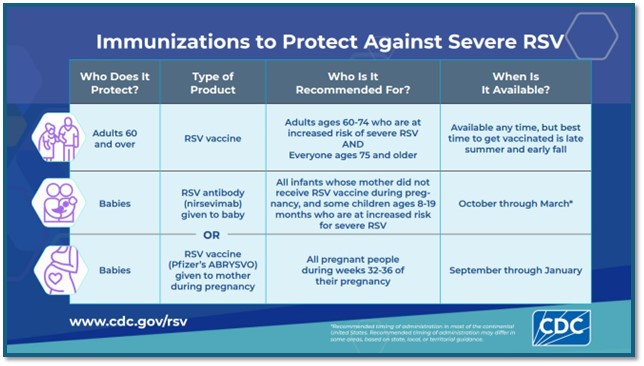RSV (Respiratory Syncytial Virus)
- RSV is a common respiratory virus that usually causes mild, cold-like symptoms.
- Infants and older adults are more likely to develop severe RSV and need hospitalization.
- CDC recommends immunizations to protect infants, some young children, and older adults.
- The U.S. Food and Drug Administration licenses three RSV vaccines for use in adults ages 60 and older in the United States.
- CDC recommends that everyone aged 75 and older get an RSV vaccine.
- CDC recommends adults ages 60–74 who are at increased risk of severe RSV disease get an RSV vaccine.
- If you have already gotten an RSV vaccine, you do not need to get another one at this time.
- You can get one anytime, but the best time to get vaccinated is in late summer and early fall.
Recognizing the Symptoms of RSV
RSV symptoms can mimic those of a common cold, but it’s important to know when they might signal something more serious. Common symptoms include:
- Runny nose
- Coughing and sneezing
- Fever
- Decreased appetite
- Wheezing or difficulty breathing
In severe cases, infants might show signs of respiratory distress, such as:
- Rapid breathing or gasping for air
- Flared nostrils
- Bluish skin color due to lack of oxygen
Who should get an RSV vaccine?
The CDC recommends an RSV vaccine for all adults ages 75 years and older and for adults ages 60–74 years who are at increased risk of severe RSV.
Conditions that increase your risk for severe illness include:
- Chronic heart or lung disease
- Weakened immune system
- Certain other medical conditions, including some people with diabetes and some people with obesity
- Living in a nursing home
For a complete list of chronic health issues that lead to increased risk of severe RSV, see Clinical Overview of RSV.
If you have already gotten an RSV vaccine, you do not need to get another one at this time.
If you are eligible for an RSV vaccine, the best time to get vaccinated is now (late summer through early fall) – before the RSV season starts!
RSV Immunizations to Protect Infants
The Potential Harms of RSV
RSV causes mild symptoms in most people but can be more severe in infants, premature babies, individuals with weakened immune systems, and those with underlying health conditions. It can lead to serious complications such as bronchiolitis and pneumonia, especially in high-risk groups.
Protecting Your Child from RSV
To protect children from RSV:
- Consider RSV vaccination for infants and adults over 60.
- Practice good hygiene, including frequent handwashing and avoiding close contact with sick individuals.
- Limit a baby’s exposure to crowded places, especially during peak RSV season.
The CDC recommends all babies be protected from severe RSV by one of two immunization options:
- A maternal RSV vaccine (Pfizer’s Abrysvo) given to the mother during weeks 32 – 36 of pregnancy
- An RSV antibody (nirsevimab) given to the baby.
- RSV antibody should be administered in the first week after birth – ideally during the birth hospitalization, or shortly before the RSV season if they are born outside of RSV season.
- Nirsevimab is also recommended for a small group of young children 8 – 19 months of age who are at increased risk for severe RSV.
Most babies will not need both.
Both RSV immunizations to protect infants are administered during specific months, detailed here:
* For infants born outside of this window (April – September) and for young children who are at increased risk for severe RSV disease and entering their second RSV season, the optimal timing for nirsevimab administration is shortly before the RSV season begins (October or November).
For more information visit: Immunizations to Protect Infants | RSV | CDC
10/7/24



